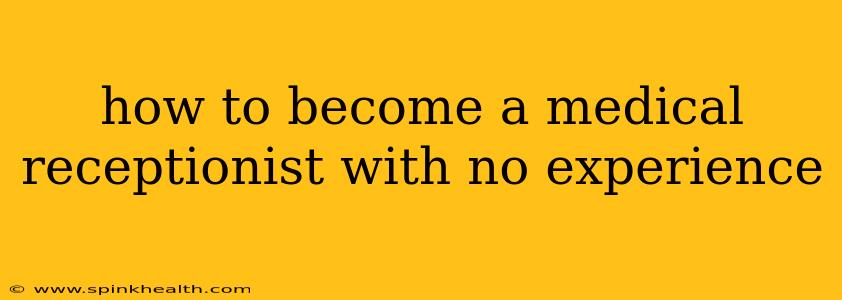How to Become a Medical Receptionist With No Experience: A Journey From Zero to Hero
So, you dream of a career in healthcare, but lack the traditional experience needed to land that coveted medical receptionist role? Don't worry, you're not alone! Many successful medical receptionists started with little to no prior experience. This isn't a field that demands years of specialized training upfront; it's about demonstrating the right attitude, skills, and willingness to learn. This story will guide you on your path to becoming a medical receptionist, even if you're starting from scratch.
What Skills Do Medical Receptionists Need? (People Also Ask: What are the most important skills for a medical receptionist?)
This isn't just about answering phones! While phone etiquette is crucial, medical receptionists are the heart of the clinic's front office, juggling many crucial tasks simultaneously. Key skills include:
- Exceptional Communication Skills: You'll be interacting with patients, doctors, and insurance companies – all requiring clear, concise, and empathetic communication.
- Strong Organizational Skills: Managing appointments, patient files, and insurance information demands excellent organizational skills. Think meticulous record-keeping and efficient scheduling.
- Computer Proficiency: Medical offices rely heavily on electronic health records (EHR) systems and other software. Basic computer literacy is a must, with proficiency in Microsoft Office a significant advantage.
- Multitasking Abilities: Handling multiple phone calls, greeting patients, managing paperwork, and processing payments concurrently is a daily reality.
- Problem-Solving Skills: You'll encounter various issues, from scheduling conflicts to insurance claim denials. Resourcefulness and the ability to find solutions are essential.
- Medical Terminology: While not essential initially, learning medical terminology will significantly boost your effectiveness and confidence.
How Can I Get Experience if I Have None? (People Also Ask: What kind of jobs can help you gain experience for a medical receptionist position?)
Gaining experience without prior experience might seem paradoxical, but it's achievable through several routes:
- Volunteer at a Clinic or Hospital: Offering your time as a volunteer in a medical setting provides invaluable hands-on experience and demonstrates your commitment. This allows you to observe daily operations, familiarize yourself with medical terminology, and even assist with minor tasks.
- Seek an Entry-Level Position: Look beyond the title of "Medical Receptionist." Consider roles like office assistant, administrative assistant, or receptionist in a related field (dental, veterinary). These positions offer transferable skills and expose you to a similar work environment.
- Internships: Some medical facilities offer internships specifically for aspiring medical receptionists. These programs offer supervised training and build your resume.
- Online Courses: Many online platforms offer courses covering medical billing and coding, medical terminology, and other relevant subjects. Adding these credentials to your resume boosts your candidacy.
What Education or Certifications Do I Need? (People Also Ask: Is a degree required to be a medical receptionist?)
While a formal degree isn't always mandatory, a high school diploma or GED is the minimum requirement. However, certifications like a Certified Medical Assistant (CMA) or a Certified Professional Coder (CPC) can significantly enhance your resume and demonstrate commitment to the field. These certifications, while not always required, show employers you’ve dedicated time to honing relevant skills.
How to Write a Compelling Resume and Cover Letter (People Also Ask: What should I highlight on my resume for a medical receptionist position with no experience?)
Your resume and cover letter are your first impression. Highlight transferable skills from previous jobs, emphasizing your organizational abilities, communication skills, and computer proficiency. If you volunteered or took online courses, mention those experiences prominently. Your cover letter should be tailored to each specific job application, highlighting how your skills align with the employer's needs. Emphasize your eagerness to learn and your dedication to providing excellent patient care.
The Interview Process: Making a Great First Impression
Practice answering common interview questions, such as "Tell me about yourself," "Why are you interested in this position?", and "How do you handle stress?". Showcase your enthusiasm, positive attitude, and willingness to learn. Research the clinic or medical practice beforehand to demonstrate your genuine interest. Remember, your personality and work ethic can be as important as your experience.
Becoming a medical receptionist with no experience is entirely achievable. It’s a journey that demands proactive steps, a willingness to learn, and a passionate dedication to the healthcare industry. By focusing on developing the right skills and strategically showcasing your abilities, you can transform your dream into a reality.

